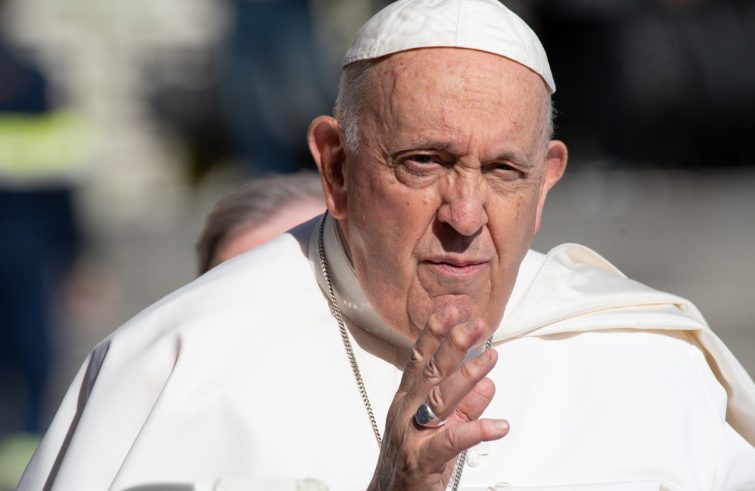
“May everyone may be inspired by peaceful resolutions, including those with political responsibilities”, Pope Francis said at the end of the Wednesday general audience in St. Peter’s Square. The Holy Father reiterated the appeal to “continue to pray for the dear and tormented Ukraine, that is suffering so much.” In his greetings to the young people from Rondine Peace Citadel in Arezzo, the Pope extended
“a grateful thought to all those who have come from Ukraine and Russia and other war-torn countries and have decided not to be enemies, but to live together as brothers and sisters. May your example inspire peaceful resolutions in all, including those with political responsibilities.”
The Pope dedicated his catechesis to Venerable Matteo Ricci, the Jesuit missionary who introduced Christianity to China, and whose “secret” was coherence, part of “a personality that bears witness to what he preaches with his own life.” “After studying in the Jesuit schools and entering Society of Jesus in Rome, he was enthused by the reports of missionaries whom he had listened to and he grew enthusiastic, like so many other young people who felt the same, and he asked to be sent to the missions in the Far East”, Francis said retracing his biography: “After the attempt by Francis Xavier, another twenty-five Jesuits had tried to enter China, without success. But Ricci and one of his confrères prepared themselves very well, carefully studying the Chinese language and customs, and in the end, they managed to settle in the south of the country. It took eighteen years, with four stages through four different cities, to arrive in Peking, which was the centre. With perseverance and patience, inspired by unshakeable faith, Matteo Ricci was able to overcome difficulties and dangers, mistrust and opposition.”
“Besides doctrine, his witness of religious life, virtue and prayer is what nourished the missionary life, a life of charity; they helped others, humbly, with total disinterest in honours and riches, which led many of his disciples and friends to embrace the Catholic faith”, the Pope argued: “This is the coherence of the evangelizers. And this applies to all of us Christians who are evangelizers. We can recite the Creed by heart, we can say all the things we believe, but if our life is not consistent with this, it is of no use. What attracts people is the witness of consistency: we Christians must live as we say, and not pretend to live as Christians but to live in a worldly way. Looking at these great missionaries, see that the greatest strength is consistency.”
“The missionary spirit of Matteo Ricci constitutes a relevant living model – Francis concluded – but the truly timely path is coherence of life, of the witness of his Christian belief. He took Christianity to China; he is great, yes, because he is a great scientist, he is great because he is courageous – but above all, he is great because he was consistent in his vocation, consistent in his desire to follow Jesus Christ. let us ask ourselves inwardly, “Am I consistent, or am I a bit ‘so-so’?”.
Father Matteo Ricci, the Pope said, “always followed the way of dialogue and friendship with all the people he encountered, and this opened many doors to him for the proclamation of the Christian faith.”
His first work in Chinese was indeed a treatise “On friendship”, which “had great resonance”: “To enter into Chinese culture and life, he first dressed like the Buddhist bonzes, according to the customs of the country, but then he understood that the best way was to assume the lifestyle and robes of the literati. The intellectuals dressed like university professors, and he dressed that way. He studied their classical texts in depth, so that he could present Christianity in positive dialogue with their Confucian wisdom and the customs of Chinese society.” “And this is called an attitude of inculturation”, Francis remarked, adding that “Ricci’s fame as a man of science should not obscure the deepest motivation of all his efforts: namely, the proclamation of the Gospel.” “His excellent scientific knowledge stirred interest and admiration on the part of cultured men, starting from his famous map of the entire world as it was known at the time, with the different continents, which revealed to the Chinese for the first time a reality outside China far more extensive than they had thought. He showed them that the world was even larger than China”, the Pope pointed out: “But the mathematical and astronomical knowledge of Ricci and his missionary followers also contributed to a fruitful encounter between the culture and science of the West and the East, which went on to experience one of its happiest times, characterized by dialogue and friendship. Indeed, Matteo Ricci’s work would never have been possible without the collaboration of his great Chinese friends, such as the famous ‘Doctor Paul’ (Xu Guangqi) and ‘Doctor Leon’ (Li Zhizao). The credibility obtained through scientific dialogue gave him the authority to propose the truth of Christian faith and morality, such as The true meaning of the Lord of Heaven.”











